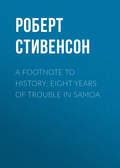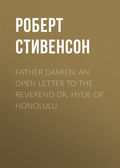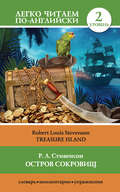
Роберт Льюис Стивенсон
The Black Arrow
CHAPTER V – THE GOOD HOPE (continued)
The pier was not far distant from the house in which Joanna lay; it now only remained to get the men on shore, to surround the house with a strong party, burst in the door and carry off the captive. They might then regard themselves as done with the Good Hope; it had placed them on the rear of their enemies; and the retreat, whether they should succeed or fail in the main enterprise, would be directed with a greater measure of hope in the direction of the forest and my Lord Foxham’s reserve.
To get the men on shore, however, was no easy task; many had been sick, all were pierced with cold; the promiscuity and disorder on board had shaken their discipline; the movement of the ship and the darkness of the night had cowed their spirits. They made a rush upon the pier; my lord, with his sword drawn on his own retainers, must throw himself in front; and this impulse of rabblement was not restrained without a certain clamour of voices, highly to be regretted in the case.
When some degree of order had been restored, Dick, with a few chosen men, set forth in advance. The darkness on shore, by contrast with the flashing of the surf, appeared before him like a solid body; and the howling and whistling of the gale drowned any lesser noise.
He had scarce reached the end of the pier, however, when there fell a lull of the wind; and in this he seemed to hear on shore the hollow footing of horses and the clash of arms. Checking his immediate followers, he passed forward a step or two alone, even setting foot upon the down; and here he made sure he could detect the shape of men and horses moving. A strong discouragement assailed him. If their enemies were really on the watch, if they had beleaguered the shoreward end of the pier, he and Lord Foxham were taken in a posture of very poor defence, the sea behind, the men jostled in the dark upon a narrow causeway. He gave a cautious whistle, the signal previously agreed upon.
It proved to be a signal far more than he desired. Instantly there fell, through the black night, a shower of arrows sent at a venture; and so close were the men huddled on the pier that more than one was hit, and the arrows were answered with cries of both fear and pain. In this first discharge, Lord Foxham was struck down; Hawksley had him carried on board again at once; and his men, during the brief remainder of the skirmish, fought (when they fought at all) without guidance. That was perhaps the chief cause of the disaster which made haste to follow.
At the shore end of the pier, for perhaps a minute, Dick held his own with a handful; one or two were wounded upon either side; steel crossed steel; nor had there been the least signal of advantage, when in the twinkling of an eye the tide turned against the party from the ship. Someone cried out that all was lost; the men were in the very humour to lend an ear to a discomfortable counsel; the cry was taken up. “On board, lads, for your lives!” cried another. A third, with the true instinct of the coward, raised that inevitable report on all retreats: “We are betrayed!” And in a moment the whole mass of men went surging and jostling backward down the pier, turning their defenceless backs on their pursuers and piercing the night with craven outcry.
One coward thrust off the ship’s stern, while another still held her by the bows. The fugitives leaped, screaming, and were hauled on board, or fell back and perished in the sea. Some were cut down upon the pier by the pursuers. Many were injured on the ship’s deck in the blind haste and terror of the moment, one man leaping upon another, and a third on both. At last, and whether by design or accident, the bows of the Good Hope were liberated; and the ever-ready Lawless, who had maintained his place at the helm through all the hurly-burly by sheer strength of body and a liberal use of the cold steel, instantly clapped her on the proper tack. The ship began to move once more forward on the stormy sea, its scuppers running blood, its deck heaped with fallen men, sprawling and struggling in the dark.
Thereupon, Lawless sheathed his dagger, and turning to his next neighbour, “I have left my mark on them, gossip,” said he, “the yelping, coward hounds.”
Now, while they were all leaping and struggling for their lives, the men had not appeared to observe the rough shoves and cutting stabs with which Lawless had held his post in the confusion. But perhaps they had already begun to understand somewhat more clearly, or perhaps another ear had overheard, the helmsman’s speech.
Panic-stricken troops recover slowly, and men who have just disgraced themselves by cowardice, as if to wipe out the memory of their fault, will sometimes run straight into the opposite extreme of insubordination. So it was now; and the same men who had thrown away their weapons and been hauled, feet foremost, into the Good Hope, began to cry out upon their leaders, and demand that someone should be punished.
This growing ill-feeling turned upon Lawless.
In order to get a proper offing, the old outlaw had put the head of the Good Hope to seaward.
“What!” bawled one of the grumblers, “he carrieth us to seaward!”
“’Tis sooth,” cried another. “Nay, we are betrayed for sure.”
And they all began to cry out in chorus that they were betrayed, and in shrill tones and with abominable oaths bade Lawless go about-ship and bring them speedily ashore. Lawless, grinding his teeth, continued in silence to steer the true course, guiding the Good Hope among the formidable billows. To their empty terrors, as to their dishonourable threats, between drink and dignity he scorned to make reply. The malcontents drew together a little abaft the mast, and it was plain they were like barnyard cocks, “crowing for courage.” Presently they would be fit for any extremity of injustice or ingratitude. Dick began to mount by the ladder, eager to interpose; but one of the outlaws, who was also something of a seaman, got beforehand.
“Lads,” he began, “y’ are right wooden heads, I think. For to get back, by the mass, we must have an offing, must we not? And this old Lawless – ”
Someone struck the speaker on the mouth, and the next moment, as a fire springs among dry straw, he was felled upon the deck, trampled under the feet, and despatched by the daggers of his cowardly companions. At this the wrath of Lawless rose and broke.
“Steer yourselves,” he bellowed, with a curse; and, careless of the result, he left the helm.
The Good Hope was, at that moment, trembling on the summit of a swell. She subsided, with sickening velocity, upon the farther side. A wave, like a great black bulwark, hove immediately in front of her; and, with a staggering blow, she plunged headforemost through that liquid hill. The green water passed right over her from stem to stern, as high as a man’s knees; the sprays ran higher than the mast; and she rose again upon the other side, with an appalling, tremulous indecision, like a beast that has been deadly wounded.
Six or seven of the malcontents had been carried bodily overboard; and as for the remainder, when they found their tongues again, it was to bellow to the saints and wail upon Lawless to come back and take the tiller.
Nor did Lawless wait to be twice bidden. The terrible result of his fling of just resentment sobered him completely. He knew, better than any one on board, how nearly the Good Hope had gone bodily down below their feet; and he could tell, by the laziness with which she met the sea, that the peril was by no means over.
Dick, who had been thrown down by the concussion and half drowned, rose wading to his knees in the swamped well of the stern, and crept to the old helmsman’s side.
“Lawless,” he said, “we do all depend on you; y’ are a brave, steady man, indeed, and crafty in the management of ships; I shall put three sure men to watch upon your safety.”
“Bootless, my master, bootless,” said the steersman, peering forward through the dark. “We come every moment somewhat clearer of these sandbanks; with every moment, then, the sea packeth upon us heavier, and for all these whimperers, they will presently be on their backs. For, my master, ’tis a right mystery, but true, there never yet was a bad man that was a good shipman. None but the honest and the bold can endure me this tossing of a ship.”
“Nay, Lawless,” said Dick, laughing, “that is a right shipman’s byword, and hath no more of sense than the whistle of the wind. But, prithee, how go we? Do we lie well? Are we in good case?”
“Master Shelton,” replied Lawless, “I have been a Grey Friar – I praise fortune – an archer, a thief, and a shipman. Of all these coats, I had the best fancy to die in the Grey Friar’s, as ye may readily conceive, and the least fancy to die in John Shipman’s tarry jacket; and that for two excellent good reasons: first, that the death might take a man suddenly; and second, for the horror of that great, salt smother and welter under my foot here” – and Lawless stamped with his foot. “Howbeit,” he went on, “an I die not a sailor’s death, and that this night, I shall owe a tall candle to our Lady.”
“Is it so?” asked Dick.
“It is right so,” replied the outlaw. “Do ye not feel how heavy and dull she moves upon the waves? Do ye not hear the water washing in her hold? She will scarce mind the rudder even now. Bide till she has settled a bit lower; and she will either go down below your boots like a stone image, or drive ashore here, under our lee, and come all to pieces like a twist of string.”
“Ye speak with a good courage,” returned Dick. “Ye are not then appalled?”
“Why, master,” answered Lawless, “if ever a man had an ill crew to come to port with, it is I – a renegade friar, a thief, and all the rest on’t. Well, ye may wonder, but I keep a good hope in my wallet; and if that I be to drown, I will drown with a bright eye, Master Shelton, and a steady hand.”
Dick returned no answer; but he was surprised to find the old vagabond of so resolute a temper, and fearing some fresh violence or treachery, set forth upon his quest for three sure men. The great bulk of the men had now deserted the deck, which was continually wetted with the flying sprays, and where they lay exposed to the shrewdness of the winter wind. They had gathered, instead, into the hold of the merchandise, among the butts of wine, and lighted by two swinging lanterns.
Here a few kept up the form of revelry, and toasted each other deep in Arblaster’s Gascony wine. But as the Good Hope continued to tear through the smoking waves, and toss her stem and stern alternately high in air and deep into white foam, the number of these jolly companions diminished with every moment and with every lurch. Many sat apart, tending their hurts, but the majority were already prostrated with sickness, and lay moaning in the bilge.
Greensheve, Cuckow, and a young fellow of Lord Foxham’s whom Dick had already remarked for his intelligence and spirit, were still, however, both fit to understand and willing to obey. These Dick set, as a body-guard, about the person of the steersman, and then, with a last look at the black sky and sea, he turned and went below into the cabin, whither Lord Foxham had been carried by his servants.
CHAPTER VI – THE GOOD HOPE (concluded)
The moans of the wounded baron blended with the wailing of the ship’s dog. The poor animal, whether he was merely sick at heart to be separated from his friends, or whether he indeed recognised some peril in the labouring of the ship, raised his cries, like minute-guns, above the roar of wave and weather; and the more superstitious of the men heard, in these sounds, the knell of the Good Hope.
Lord Foxham had been laid in a berth upon a fur cloak. A little lamp burned dim before the Virgin in the bulkhead, and by its glimmer Dick could see the pale countenance and hollow eyes of the hurt man.
“I am sore hurt,” said he. “Come near to my side, young Shelton; let there be one by me who, at least, is gentle born; for after having lived nobly and richly all the days of my life, this is a sad pass that I should get my hurt in a little ferreting skirmish, and die here, in a foul, cold ship upon the sea, among broken men and churls.”
“Nay, my lord,” said Dick, “I pray rather to the saints that ye will recover you of your hurt, and come soon and sound ashore.”
“How!” demanded his lordship. “Come sound ashore? There is, then, a question of it?”
“The ship laboureth – the sea is grievous and contrary,” replied the lad; “and by what I can learn of my fellow that steereth us, we shall do well, indeed, if we come dryshod to land.”
“Ha!” said the baron, gloomily, “thus shall every terror attend upon the passage of my soul! Sir, pray rather to live hard, that ye may die easy, than to be fooled and fluted all through life, as to the pipe and tabor, and, in the last hour, be plunged among misfortunes! Howbeit, I have that upon my mind that must not be delayed. We have no priest aboard?”
“None,” replied Dick.
“Here, then, to my secular interests,” resumed Lord Foxham: “ye must be as good a friend to me dead, as I found you a gallant enemy when I was living. I fall in an evil hour for me, for England, and for them that trusted me. My men are being brought by Hamley – he that was your rival; they will rendezvous in the long holm at Holywood; this ring from off my finger will accredit you to represent mine orders; and I shall write, besides, two words upon this paper, bidding Hamley yield to you the damsel. Will he obey? I know not.”
“But, my lord, what orders?” inquired Dick.
“Ay,” quoth the baron, “ay – the orders;” and he looked upon Dick with hesitation. “Are ye Lancaster or York?” he asked, at length.
“I shame to say it,” answered Dick, “I can scarce clearly answer. But so much I think is certain: since I serve with Ellis Duckworth, I serve the house of York. Well, if that be so, I declare for York.”
“It is well,” returned the other; “it is exceeding well. For, truly, had ye said Lancaster, I wot not for the world what I had done. But sith ye are for York, follow me. I came hither but to watch these lords at Shoreby, while mine excellent young lord, Richard of Gloucester[1], prepareth a sufficient force to fall upon and scatter them. I have made me notes of their strength, what watch they keep, and how they lie; and these I was to deliver to my young lord on Sunday, an hour before noon, at St. Bride’s Cross beside the forest. This tryst I am not like to keep, but I pray you, of courtesy, to keep it in my stead; and see that not pleasure, nor pain, tempest, wound, nor pestilence withhold you from the hour and place, for the welfare of England lieth upon this cast.”
“I do soberly take this up on me,” said Dick. “In so far as in me lieth, your purpose shall be done.”
“It is good,” said the wounded man. “My lord duke shall order you farther, and if ye obey him with spirit and good will, then is your fortune made. Give me the lamp a little nearer to mine eyes, till that I write these words for you.”
He wrote a note “to his worshipful kinsman, Sir John Hamley;” and then a second, which he-left without external superscripture.
“This is for the duke,” he said. “The word is ‘England and Edward,’ and the counter, ‘England and York.’”
“And Joanna, my lord?” asked Dick.
“Nay, ye must get Joanna how ye can,” replied the baron. “I have named you for my choice in both these letters; but ye must get her for yourself, boy. I have tried, as ye see here before you, and have lost my life. More could no man do.”
By this time the wounded man began to be very weary; and Dick, putting the precious papers in his bosom, bade him be of good cheer, and left him to repose.
The day was beginning to break, cold and blue, with flying squalls of snow. Close under the lee of the Good Hope, the coast lay in alternate rocky headlands and sandy bays; and further inland the wooded hill-tops of Tunstall showed along the sky. Both the wind and the sea had gone down; but the vessel wallowed deep, and scarce rose upon the waves.
Lawless was still fixed at the rudder; and by this time nearly all the men had crawled on deck, and were now gazing, with blank faces, upon the inhospitable coast.
“Are we going ashore?” asked Dick.
“Ay,” said Lawless, “unless we get first to the bottom.”
And just then the ship rose so languidly to meet a sea, and the water weltered so loudly in her hold, that Dick involuntarily seized the steersman by the arm.
“By the mass!” cried Dick, as the bows of the Good Hope reappeared above the foam, “I thought we had foundered, indeed; my heart was at my throat.”
In the waist, Greensheve, Hawksley, and the better men of both companies were busy breaking up the deck to build a raft; and to these Dick joined himself, working the harder to drown the memory of his predicament. But, even as he worked, every sea that struck the poor ship, and every one of her dull lurches, as she tumbled wallowing among the waves, recalled him with a horrid pang to the immediate proximity of death.
Presently, looking up from his work, he saw that they were close in below a promontory; a piece of ruinous cliff, against the base of which the sea broke white and heavy, almost overplumbed the deck; and, above that, again, a house appeared, crowning a down.
Inside the bay the seas ran gayly, raised the Good Hope upon their foam-flecked shoulders, carried her beyond the control of the steersman, and in a moment dropped her, with a great concussion, on the sand, and began to break over her half-mast high, and roll her to and fro. Another great wave followed, raised her again, and carried her yet farther in; and then a third succeeded, and left her far inshore of the more dangerous breakers, wedged upon a bank.
“Now, boys,” cried Lawless, “the saints have had a care of us, indeed. The tide ebbs; let us but sit down and drink a cup of wine, and before half an hour ye may all march me ashore as safe as on a bridge.”
A barrel was broached, and, sitting in what shelter they could find from the flying snow and spray, the shipwrecked company handed the cup around, and sought to warm their bodies and restore their spirits.
Dick, meanwhile, returned to Lord Foxham, who lay in great perplexity and fear, the floor of his cabin washing knee-deep in water, and the lamp, which had been his only light, broken and extinguished by the violence of the blow.
“My lord,” said young Shelton, “fear not at all; the saints are plainly for us; the seas have cast us high upon a shoal, and as soon as the tide hath somewhat ebbed, we may walk ashore upon our feet.”
It was nearly an hour before the vessel was sufficiently deserted by the ebbing sea; and they could set forth for the land, which appeared dimly before them through a veil of driving snow.
Upon a hillock on one side of their way a party of men lay huddled together, suspiciously observing the movements of the new arrivals.
“They might draw near and offer us some comfort,” Dick remarked.
“Well, an’ they come not to us, let us even turn aside to them,” said Hawksley. “The sooner we come to a good fire and a dry bed the better for my poor lord.”
But they had not moved far in the direction of the hillock, before the men, with one consent, rose suddenly to their feet, and poured a flight of well-directed arrows on the shipwrecked company.
“Back! back!” cried his lordship. “Beware, in Heaven’s name, that ye reply not.”
“Nay,” cried Greensheve, pulling an arrow from his leather jack. “We are in no posture to fight, it is certain, being drenching wet, dog-weary, and three-parts frozen; but, for the love of old England, what aileth them to shoot thus cruelly on their poor country people in distress?”
“They take us to be French pirates,” answered Lord Foxham. “In these most troublesome and degenerate days we cannot keep our own shores of England; but our old enemies, whom we once chased on sea and land, do now range at pleasure, robbing and slaughtering and burning. It is the pity and reproach of this poor land.”
The men upon the hillock lay, closely observing them, while they trailed upward from the beach and wound inland among desolate sand-hills; for a mile or so they even hung upon the rear of the march, ready, at a sign, to pour another volley on the weary and dispirited fugitives; and it was only when, striking at length upon a firm high-road, Dick began to call his men to some more martial order, that these jealous guardians of the coast of England silently disappeared among the snow. They had done what they desired; they had protected their own homes and farms, their own families and cattle; and their private interest being thus secured, it mattered not the weight of a straw to any one of them, although the Frenchmen should carry blood and fire to every other parish in the realm of England.







